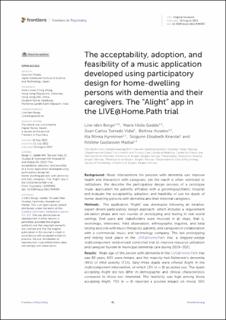| dc.contributor.author | Berge, Line Iden | |
| dc.contributor.author | Gedde, Marie H. | |
| dc.contributor.author | Torrado Vidal, Juan Carlos | |
| dc.contributor.author | Husebø, Bettina Elisabeth Franziska | |
| dc.contributor.author | Hynninen, Kia Minna | |
| dc.contributor.author | Knardal, Solgunn | |
| dc.contributor.author | Madsø, Kristine Gustavsen | |
| dc.date.accessioned | 2022-12-30T09:33:19Z | |
| dc.date.available | 2022-12-30T09:33:19Z | |
| dc.date.created | 2022-10-28T07:17:38Z | |
| dc.date.issued | 2022 | |
| dc.identifier.issn | 1664-0640 | |
| dc.identifier.uri | https://hdl.handle.net/11250/3040029 | |
| dc.description.abstract | Background: Music interventions for persons with dementia can improve health and interaction with caregivers, yet the reach is often restricted to institutions. We describe the participatory design process of a prototype music application for patients affiliated with a gerontopsychiatric hospital and evaluate the acceptability, adoption, and feasibility of use for dyads of home-dwelling persons with dementia and their informal caregivers.
Methods: The application “Alight” was developed following an iterative, expert-driven participatory design approach, which includes a requirement elicitation phase and two rounds of prototyping and testing in real-world settings. End users and stakeholders were involved in all steps, that is, workshops, interviews, field observation, ethnographic inquiries, and beta testing sessions with music therapists, patients, and caregivers in collaboration with a commercial music and technology company. The last prototyping and testing took place in the LIVE@Home.Path trial, a stepped-wedge multicomponent randomized controlled trial to improve resource utilization and caregiver burden in municipal dementia care during 2019–2021.
Results: Mean age of the person with dementia in the LIVE@Home.Path trial was 82 years, 62% were female, and the majority had Alzheimer's dementia (44%) of mild severity (71%). Sixty-three dyads were offered Alight in the multicomponent intervention, of which 13% (n = 8) accepted use. The dyads accepting Alight did not differ in demographic and clinical characteristics compared to those not interested. The feasibility was high among those accepting Alight, 75% (n = 6) reported a positive impact on mood, 50% (n = 4) experienced a positive impact on activity, and 50% (n = 4) gooduser-friendliness. The adoption was high with daily use or use several times a week reported by 63% (n = 5). Obstacles emerged when updating the application in homes without wireless Wi-Fi, and some participants were unfamiliar with using touchscreens.
Conclusion: The feasibility and adoption of the application were high and accepting dyads did not differ on demographic and clinical variables from those not reached. This suggests a high potential for utilization in dementia care. This study contributes methodologically to the field of participatory design and mHealth interventions by demonstrating a specific design approach that throughout the process successfully involved researchers, industry partners, health care practitioners, and end users. | en_US |
| dc.language.iso | eng | en_US |
| dc.publisher | Frontiers | en_US |
| dc.rights | Navngivelse 4.0 Internasjonal | * |
| dc.rights.uri | http://creativecommons.org/licenses/by/4.0/deed.no | * |
| dc.title | The acceptability, adoption, and feasibility of a music application developed using participatory design for home-dwelling persons with dementia and their caregivers. The “Alight” app in the LIVE@Home.Path trial | en_US |
| dc.type | Journal article | en_US |
| dc.type | Peer reviewed | en_US |
| dc.description.version | publishedVersion | en_US |
| dc.rights.holder | Copyright 2022 The Author(s) | en_US |
| dc.source.articlenumber | 949393 | en_US |
| cristin.ispublished | true | |
| cristin.fulltext | original | |
| cristin.qualitycode | 1 | |
| dc.identifier.doi | 10.3389/fpsyt.2022.949393 | |
| dc.identifier.cristin | 2065875 | |
| dc.source.journal | Frontiers in Psychiatry | en_US |
| dc.relation.project | Norges forskningsråd: 273581 | en_US |
| dc.relation.project | Norges forskningsråd: 288164 | en_US |
| dc.identifier.citation | Frontiers in Psychiatry. 2022, 13, 949393. | en_US |
| dc.source.volume | 13 | en_US |

